|
Here are all the paintings of GRECO, El 02
| ID |
Painting |
Oil Pantings, Sorted from A to Z |
Painting Description |
| 43799 |
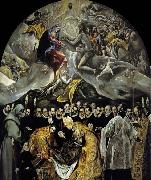 |
The Burial of the Count of Orgaz |
1586-88
Oil on canvas,
480 x 360 cm |
| 43800 |
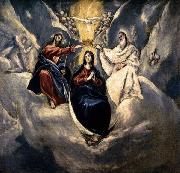 |
The Coronation of the Virgin |
1591
Oil on canvas,
90 x 100 cm |
| 62336 |
 |
The Crucifixion |
1596-1600 Oil on canvas, 312 x 169 cm Museo del Prado, Madrid Christ on the Cross, at the moment of expiration, with the Virgin and Saint John, and at the foot of the Cross, the Magdalene. Probably originally above the Annunciation, in the retable of the Colegio of Do?a Mar?a. This painting and the Annunciation are the two widest of the series. Already, in Santo Domingo el Antiguo, the artist had sensibly related together in composition the two central paintings of the high altar, the Assumption and Trinity. Again, there is this compositional relationship of the two paintings, but there is also something more in this bringing together of the two so diverse yet intimately related themes of the Virgin's reception of the Holy Ghost, and Christ's giving up of the Holy Ghost. One subject represents one of the Joys of the Virgin, and the other incorporates one of Her Griefs. Each painting is divided horizontally in three. The figure of Christ of the Expiration is a continuation upwards of the central zone of the Annunciation with the Flames and the Dove; the figure of the Archangel Gabriel has its counterpart in the figure of Saint John; and the Virgin of Joy appears above as the Virgin of Grief. This painting of the Crucifixion is one of the great interpretations of the subject in painting and almost inevitably brings to mind two other great Crucifixions, Gr?newald's of the Isenheim Altar and Giotto's of the Arena Chapel. El Greco has introduced more of those symbols embodying spiritual emotions: the clamouring angels with outstretched arms encircling the Body of Christ - strangely recalling Giotto's painting - and the remarkable figure of the angel at the foot of the Cross. Author: GRECO, El Title: The Crucifixion , 1551-1600 , Spanish Form: painting , religious |
| 43751 |
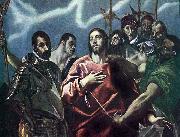 |
The Disrobing of Christ |
c. 1600
Oil on canvas,
129 x 160 cm |
| 7061 |
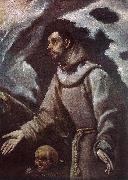 |
The Ecstasy of St Francis dfh |
c. 1580
Oil on canvas, 102 x 75 cm
Bishop's Palace, Siedlce |
| 62346 |
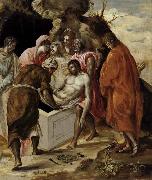 |
The Entombment of Christ late |
51,5 x 43 cm Alexandros Soutzos Museum, Athens This painting is one of the most attractive pictures of El Greco's Venetian period. The artist's barely disguised borrowings from Italian prints (e.g. the three Marys from a print of the Entombment by Parmigianino) are a notable feature of his Cretan- and Italian period pictures and reflect his formation as a painter in the post-Byzantine tradition accustomed to working from established compositional patterns. Author: GRECO, El Title: The Entombment of Christ , 1551-1600 , Spanish Form: painting , religious |
| 62329 |
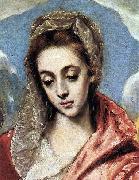 |
The Holy Family |
) 1595 Oil on canvas Hospital of Tavera, Toledo Author: GRECO, El Title: The Holy Family (detail) , 1551-1600 , Spanish Form: painting , religious |
| 7056 |
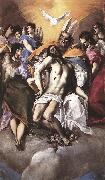 |
The Holy Trinity fg |
1577
Oil on canvas, 300 x 179 cm
Museo del Prado, Madrid |
| 7067 |
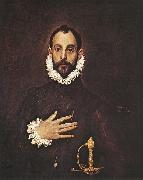 |
The Knight with His Hand on His Breast sdg |
1577-84
Oil on canvas, 81 x 66 cm
Museo del Prado, Madrid |
| 43761 |
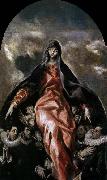 |
The Madonna of Charity |
Oil on canvas,
155 x 123 cm |
| 7060 |
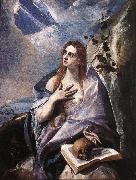 |
The Magdalene fhg |
1576-78
Oil on canvas, 157 x 121 cm
Museum of Fine Arts, Budapest |
| 43782 |
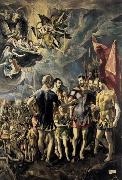 |
The Martyrdom of St Maurice |
1580-81
Oil on canvas,
448 x 301 cm |
| 43746 |
 |
The Pentecost |
Oil on canvas,
275 x 127 cm |
| 7053 |
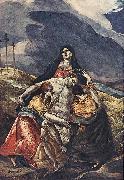 |
The Piet (The Lamentation of Christ) dfh |
1571-76
Tempera on panel. 29 x 20 cm
Philadelphia Museum of Art, Philadelphia |
| 62327 |
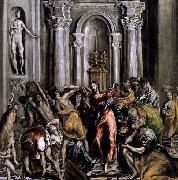 |
The Purification of the Temple after |
106 x 104 cm Parish Church of San Gin?s, Madrid This version of the subject dates from the last years of El Greco's career. It is assumed that the painting was partly executed by Jorge Manuel. However, it bears El Greco's signature and its quality is very high. The painting is very close to the version in the National Gallery in London. The most remarkable changes relate to the architectural setting. El Greco shifted the action from the Temple porch to the inner sanctuary. At the centre of the structure supporting the altarpiece is a tomb-like object with an obelisk. On the left there is a relief of the Expulsion of Adam and Eve, and above it a statue of a naked male figure who has been variously identified as Adam, his son Seth or an unidentified idol. The changes introduced into this version indicate El Greco's continuing reflection of the subject. He continued to add layers of interpretation to the end of his career |
| 43752 |
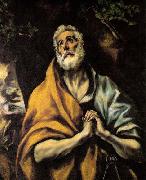 |
The Repentant Peter |
c. 1600
Oil on canvas,
94 x 75 cm |
| 43745 |
 |
The Resurrection |
Oil on canvas,
275 x 127 cm |
| 62351 |
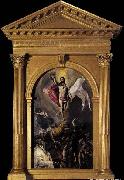 |
The Resurrection |
210 x 128 cm Church of Santo Domingo el Antiguo, Toledo Painted for the side altar on the Epistle side (right) of the church, and still in place. Probably painted 1578-79, following the completion of the High Altarpiece. The presence of Saint Ildefonso, the patron Saint of Toledo, was stipulated in the documents. Diego de Castilla, the Dean of Toledo Cathedral, is probably represented in this figure, which certainly is a portrait. The figure assists in setting an ideal plane for the enacting of the mystic event. El Greco has eliminated the intrusion of an incongruous space. The ground running parallel with the plane of the action produces no conflict. The rhythm of the passages of colour and light over the surface helps to hold together the composition, with its dramatic split revealing the figure of the Risen Christ. What suggestions remain of an ordinary conception of space, of corporeality and of a schematic quality of composition, disappear in his final version of the subject (painted in 1596-1600, now in the Prado, Madrid). Author: GRECO, El Title: The Resurrection , 1551-1600 , Spanish Form: painting , religious |
| 62352 |
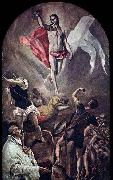 |
The Resurrection |
210 x 128 cm Church of Santo Domingo el Antiguo, Toledo Painted for the side altar on the Epistle side (right) of the church, and still in place. Probably painted 1578-79, following the completion of the High Altarpiece. The presence of Saint Ildefonso, the patron Saint of Toledo, was stipulated in the documents. Diego de Castilla, the Dean of Toledo Cathedral, is probably represented in this figure, which certainly is a portrait. The figure assists in setting an ideal plane for the enacting of the mystic event. El Greco has eliminated the intrusion of an incongruous space. The ground running parallel with the plane of the action produces no conflict. The rhythm of the passages of colour and light over the surface helps to hold together the composition, with its dramatic split revealing the figure of the Risen Christ. What suggestions remain of an ordinary conception of space, of corporeality and of a schematic quality of composition, disappear in his final version of the subject (painted in 1596-1600, now in the Prado, Madrid). Author: GRECO, El Title: The?Resurrection , 1551-1600 , Spanish Form: painting , religious |
| 7059 |
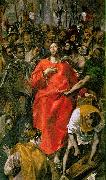 |
The Spoliation fdgh |
1577-79
Oil on canvas, 285 x 173 cm
Sacristy of the Cathedral, Toledo |
| 43750 |
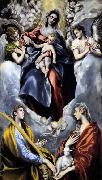 |
The Virgin and Child with St Martina and St Agnes |
597-99
Oil on canvas,
193 x 103 cm |
| 43739 |
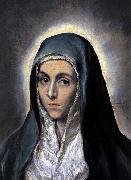 |
The Virgin Mary |
Oil on canvas,
52 x 36 cm |
| 43766 |
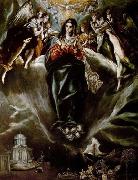 |
The Virgin of the Immaculate Conception |
1605-10
Oil on canvas,
108 x 82 cm |
| 43790 |
 |
The Virgin of the Immaculate Conception and St John |
c. 1585
Oil on canvas,
237 x 118 cm |
| 43707 |
 |
View and Plan of Toledo |
c. 1610
Oil on canvas,
132 x 228 cm |
|
|
|
Prev 1 2
|
|
| GRECO, El
|
| Greek-born Spanish Mannerist Painter, 1541-1614
Greek painter, designer and engraver, active in Italy and Spain. One of the most original and interesting painters of 16th-century Europe, he transformed the Byzantine style of his early paintings into another, wholly Western manner. He was active in his native Crete, in Venice and Rome, and, during the second half of his life, in Toledo. He was renowned in his lifetime for his originality and extravagance and provides one of the most curious examples of the oscillations of taste in the evaluation of a painter,
|
|

